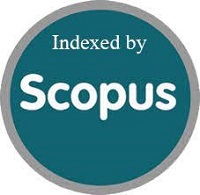Indonesian Adaptation and Validation of The Child-Adolescent Perfectionism Scale – Short Form (CAPS-SF)
DOI:
https://doi.org/10.15408/jp3i.v11i1.24272Keywords:
adolescent, confirmatory factor analysis, perfectionism-scale, reliability, validityAbstract
This study aimed to adapt and examine the psychometric properties of The Child-Adolescent Perfectionism Scale – Short Form (CAPS – SF) in an Indonesian sample. In Indonesia, research on perfectionism is being developed, but there is no measurement for adolescent perfectionism that can be used. Therefore, a valid and reliable measurement is needed. The Child-Adolescent Perfectionism Scale – Short Form (CAPS – SF) developed by Bento et al. is an instrument consisting of 2 dimensions of Socially Prescribed Perfectionism and Self-Oriented Perfectionism with a total of 9 items that can measure perfectionism in children and adolescents. The adaptation process followed the guidelines established by the International Test Commission such as translation, cognitive interview, and test of the pre-final Indonesian version which involved 322 adolescents aged 13-15 years who lived in Indonesia. Reliability test using Cronbach's Alpha and CFA, which was used to measure the construct validity, showed that the nine items in adapted The Child-Adolescent Perfectionism Scale – Short Form (CAPS – SF) could be used to measure the perfectionism of Indonesian adolescents.
References
Affrunti, N. W., & Woodruff-Borden, J. (2014). Perfectionism in pediatric anxiety and depressive disorders. Clinical Child and Family Psychology Review, 17(3), 299–317. https://doi.org/10.1007/s10567-014-0164-4.
Bento, C., Pereira, A. T., Azevedo, J., Saraiva, J., Flett, G. L., Hewitt, P. L., & Macedo, A. (2020). Development and validation of a short form of the child–adolescent perfectionism scale. Journal of Psychoeducational Assessment, 38(1), 26–36. https://doi.org/10.1177/0734282919879834.
Feher, A., Smith, M. M., Saklofske, D. H., Plouffe, R. A., Wilson, C. A., & Sherry, S. B. (2019). The big three perfectionism Scale–Short Form (BTPS-SF): Development of a brief self-report measure of multidimensional perfectionism. Journal of Psychoeducational Assessment, 1-16.
Flett, G. L., Coulter, L., Hewitt, P. L., & Nepon, T. (2011). Perfectionism, rumination, worry, and depressive symptoms in early adolescents. Canadian Journal of School Psychology, 26, 159–176. doi:10.1177/0829573511422039.
Flett, G. L., Hewitt, P. L., Besser, A., Su, C., Vaillancourt, T., Boucher, D., & Gale, O. (2016). The child-adolescent Perfectionism scale: Development, psychometric properties, and associations with stress, distress, and psychiatric symptomps. Journal of Psychoeducational Assessment, 1-19. doi:10.1177/0734282916651381.
Frost, R. O., Marten, P., Lahart, C., & Rosenblate, R. (1990). The dimensions of perfectionism. Cognitive Therapy and Research, 14(5), 449-468. https://doi.org/10.1007/BF01172967
Furr, R. M. (2011). Scale construction and psychometrics for social and personality psychology. SAGE Publication, Inc.
Hair, J. F., Black, W. C., Babin, B. J., & Anderson, R. E. (2014). Multivariate data analysis (7th ed.). Harlow: Pearson.
Hewitt, P., Flett, G., Turnbull-Donovan, W., Mikail, S. (1991). The multidimensional perfectionism scale: reliability, validity, and psychometric properties in psychiatric samples. Psychological Assessment: A Journal of Consulting and Clinical Psychology, 3, 464-468. 10.1037/1040-3590.3.3.464.
Hooper, D., Coughlan, J., & Mullen, M. R. (2008). Structural equation modelling: guidelines for determining model fit. Electronic Journal of Business Research Methods, 6(1), 53–60.
International Test Commission (ITC). (2016). The ITC guidelines for translating and adapting tests (Second edition). [www.InTestCom.org].
Johari, J., Wahab, D. A., Ramli, R., Saibani, N., Sahari, J., & Muhamad, N. (2012). Identifying student-focused intervention programmes through discrimination index. Procedia - Social and Behavioral Sciences, 60, 135–141. https://doi.org/10.1016/j.sbspro.2012.09.359.
Kahraman, S., & Bedük, Ş. B. (2016). Multiple intelligence and perfectionism in middle school gifted students. Journal for the Education of Gifted Young Scientists, 4(2), 1-13. doi:http://dx.doi.org/10.17478/JEGYS. 2016219257.
Limburg, K., Watson, H. J., Hagger, M. S., & Egan, S. J. (2017). The relationship between perfectionism and psychopathology: A meta-analysis. Journal Of Clinical Psychology, 73(10), 1301-1326.
Rutherford-Hemming, T. (2015). Determining content validity and reporting a content validity index for simulation scenarios. Nursing Education Perspectives, 36(6), 389-393. https://www.proquest.com/scholarly-journals/determining-content-validity-reporting-index/docview/1747402508/se-2?accountid=17242.
Shultz, K. S., Whitney, D. J., & Zickar, M. J. (2020). Measurement theory in action: Case studies and exercises. Routledge.
Stoeber, J. (2018). The psychology of perfectionism theory, research, applications. New York: Routledge.
Taber, K.S. (2018). The use of cronbach's alpha when developing and reporting research instruments in Science Education. Res Sci Educ 48, 1273–1296. https://doi.org/10.1007/s11165-016-9602-2.
Tourangeau, R. (2003). Cognitive aspects of survey measurement and mismeasurement. International Journal of Public Opinion Research, 15(1), 3-7.
Tyupa, S. (2011). A theoretical framework for back-translation as a quality assessment tool. New Voices in Translation Studies 7, 35-46.
Willis, G. B. (2015). Analysis of the cognitive interview in questionnaire design. Oxford University Press.
Zijlmans, E., Tijmstra, J., van der Ark, L. A., & Sijtsma, K. (2018). Item-score reliability in empirical-data sets and its relationship with other item indices. Educational and psychological measurement, 78(6), 998–1020. https://doi.org/10.1177/0013164417728358.



